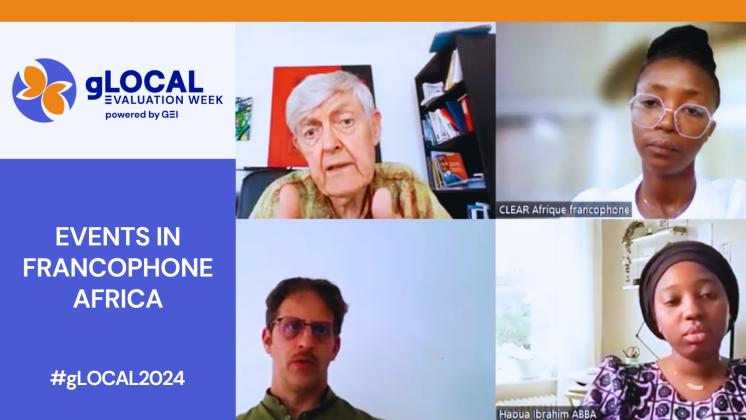Change through Evaluation: Insights from gLOCAL 2024 Events in Francophone Africa

During gLOCAL Evaluation Week 2024, the Center for Learning on Evaluation and Results for Francophone Africa (CLEAR-FA) coordinated four webinars exploring important themes for improving monitoring and evaluation (M&E) practices in Francophone Africa.
Meta-evaluation: A tool for maximizing the impact of evaluations to inform decision-making in Francophone Africa
In the dynamic field of public policy evaluation in Francophone Africa, one tool is emerging as a catalyst for change: meta-evaluation. This innovative approach goes beyond traditional evaluation by examining not only the policies themselves, but also the quality and impact of the evaluations carried out.
One of the gLOCAL events organized by CLEAR-FA explored in depth how meta-evaluation can transform evaluations into more powerful instruments for decision-making. The event brought together well-known evaluation experts, including Abdoulaye Gounou, Director General of Evaluation and the Observatory of Social Change at the Ministry of Development and Coordination of Government Action in Benin; Haoua Ibrahim Abba, Junior Officer at the Development of National Evaluation Systems at CLEAR-FA; Dr. Miché Ouedraogo, President of the African Evaluation Association (AfrEA), Damase Eric Sossou, M&E Senior Specialist at CLEAR-FA, and Dr. Beaudelaire Hounliho, Deputy Director General of State Holdings and Denationalization at the Ministry of Economy and Finance of Benin. Jérôme Babatoundé Ague of CLEAR-FA moderated the session, which was conducted in French.
One of the highlights of the webinar was the emphasis placed on the participatory approach to meta-evaluation. By actively involving stakeholders at every stage of the process, from defining the objectives to analyzing the results, this approach ensures that the results are taken on board and incorporated into public policy.
Navigating uncertainty: Adaptive evaluation methodologies in the context of conflict
In this gLOCAL event, experts shared innovative strategies and concrete experiences aimed at transforming the way we evaluate in times of crisis. Panelists included Dr. Keita Abdourahamane dit Baffa, Lead Corporate Performance and Result Specialist at the Islamic Development Bank; Dr. Pascal Kacou, Consultant and Expert in M&E; Alexis Tabo, Independent Consultant and Expert in M&E; Armando Tonfack, M&E Manager, Norwegian Refugee Council in DR Congo; and Nino Sandjo, Head of the Monitoring and Evaluation Department at Action Contre la Faim in Burkina Faso. They discussed challenges and strategies for evaluating humanitarian interventions in conflict environments in Africa.
Adaptive methodologies, such as outcome mapping, were highlighted as essential tools for capturing significant changes despite security challenges. Emphasis was placed on the engagement of local communities and the innovative use of technologies to enhance the impact of evaluations in unstable contexts.
Making evaluation results more accessible for better use in decision-making in Francophone Africa: Lessons learned from the evaluation meta-synthesis experience in Madagascar
In the complex environment of policymaking in Francophone Africa, access to reliable and relevant data is crucial. This gLOCAL event examined how evaluation meta-synthesis has been used to inform public policy in Madagascar.
Meta-synthesis, as explained during the webinar, represents a strategic approach to aggregating and reinterpreting the results of multiple assessments. It provides in-depth answers to strategic questions posed by policymakers and development practitioners, drawing on accumulated experience and avoiding duplication of effort. Francine Betou Ada, M&E Capacity Development Officer at CLEAR-FA, underscored the importance of this approach in meeting the diverse needs of end-users. Ian Hopwood, an M&E Specialist, spoke of the need for rigorous methodologies and stakeholder participation throughout the evaluation process. Dr. Lucas Oesch, an independent consultant in development cooperation; Florence Secula, expert consultant in public health; and Ndriakita Solonionjanirina, expert in research and evaluation at UNICEF Burundi, highlighted the methodological challenges and the need for analytical rigor to guarantee the credibility of the results. Haoua Ibrahim Abba, junior officer in charge of developing national evaluation systems at CLEAR-FA, shared her experiences in strengthening local evaluation capacities for the strategic use of data.
Balancing ambition and realism: Transformational change of an emerging evaluator
Soukeyna Ouedraogo, Deputy Director of CLEAR-FA, shared her inspiring journey in the field of evaluation in Francophone Africa. During the webinar, she talked about the personal and professional challenges she had to overcome. As an independent consultant, she often had to juggle varied and sometimes conflicting client demands, requiring meticulous communication and skillful contract negotiation.
Despite these obstacles, Soukeyna's journey is a testament to her resilience and commitment to lifelong learning. Her willingness to develop herself through training opportunities has enriched her expertise and opened the door to more rewarding projects. Her story emphasized the importance of balancing ambition with realism, as well as the resilience needed to succeed in this field.
"Monitoring and evaluation are dynamic fields, and it's important to keep learning and adapting,” Soukeyna said. "To participants who are at the start of their careers, I would really suggest, be open to learning, adapting, and seizing opportunities as they arise. Perseverance and commitment are the keys to success."
The gLOCAL 2024 webinars served as essential spaces for reflection, where experts could share their knowledge and experiences in catalyzing significant changes in evaluation practice in Francophone Africa. Each session brought a unique perspective, paving the way for a more strategic use of evaluations to inform public policy and strengthen sustainable development in the region.